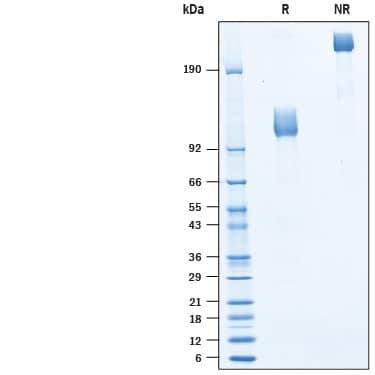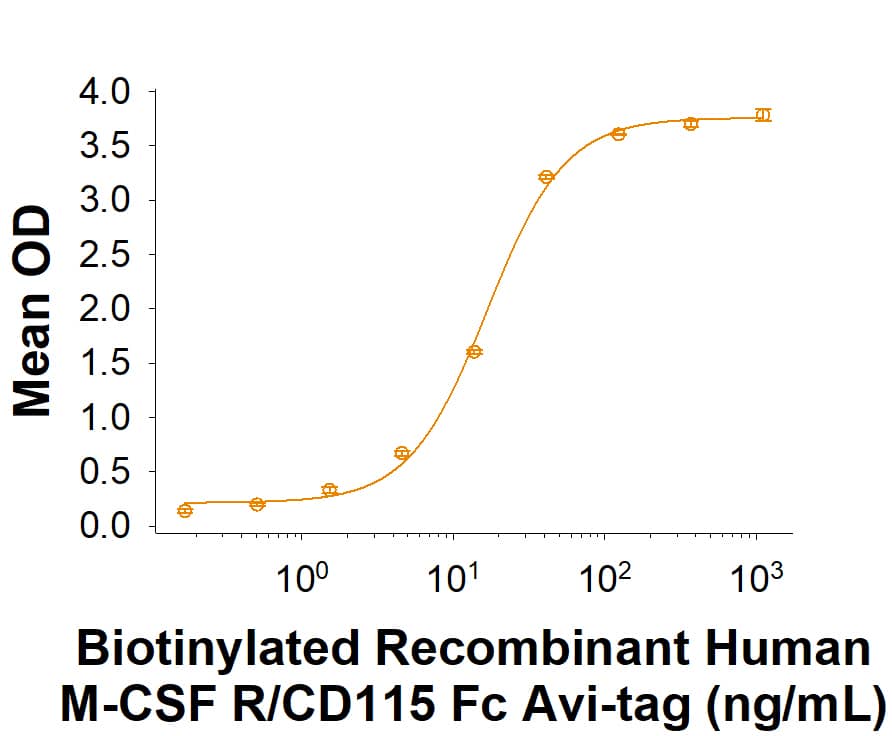Recombinant Human M-CSF R/CD115 Fc Avi-tag Protein, CF
R&D Systems, part of Bio-Techne | Catalog # AVI10339

Key Product Details
- R&D Systems CHO-derived Recombinant Human M-CSF R/CD115 Fc Avi-tag Protein (AVI10339)
- Quality control testing to verify active proteins with lot specific assays by in-house scientists
- All R&D Systems proteins are covered with a 100% guarantee
Product Specifications
Source
| Human M-CSF R/CD115 (Ile20-Thr516) Accession # P07333.2 |
IEGRMD | Human IgG1 (Pro100-Lys330) |
Avi-tag |
| N-terminus | C-terminus | ||
Purity
Endotoxin Level
N-terminal Sequence Analysis
Predicted Molecular Mass
SDS-PAGE
Activity
Measured by its binding ability in a functional ELISA.
When Human M‑CSF (Catalog # 216-MC) is immobilized at 1 µg/mL (100 µL/well), it binds to Biotinylated Recombinant Human M‑CSF R/CD115 Fc Chimera Avi-tag (Catalog # AVI10339) with an ED50 of 6-36 ng/mL.
Scientific Data Images for Recombinant Human M-CSF R/CD115 Fc Avi-tag Protein, CF
Recombinant Human M-CSF R/CD115 Fc Avi-tag Protein Binding Activity
When Human M-CSF (Catalog # 216-MC) is immobilzed at 1 µg/mL (100 µL/well), Biotinylated Recombinant Human M-CSF R/CD115 Fc Chimera Avi-tag (Catalog # AVI10339) binds with an ED50 of 6-36 ng/mL.Recombinant Human M-CSF R/CD115 Fc Avi-tag Protein SDS-PAGE
2 μg/lane of Biotinylated Recombinant Human M-CSF R/CD115 Fc Chimera Avi-tag (Catalog # AVI10339) was resolved with SDS-PAGE under reducing (R) and non-reducing (NR) conditions and visualized by Coomassie® Blue staining, showing bands at 100-120 kDa and 200-240 kDa, respectively.Formulation, Preparation and Storage
AVI10339
| Formulation | Lyophilized from a 0.2 μm filtered solution in PBS with Trehalose. |
| Reconstitution | Reconstitute at 500 μg/mL in PBS. |
| Shipping | The product is shipped at ambient temperature. Upon receipt, store it immediately at the temperature recommended below. |
| Stability & Storage | Use a manual defrost freezer and avoid repeated freeze-thaw cycles.
|
Background: M-CSF R/CD115
M-CSF receptor, the product of the c-fms proto-oncogene, is a member of the type III subfamily of receptor tyrosine kinases that also includes receptors for SCF and PDGF. These receptors each contain five immunoglobulin-like domains in their extracellular domain (ECD) and a split kinase domain in their intracellular region (1-4). M-CSF receptor is expressed primarily on cells of the monocyte/macrophage lineage, dendritic cells, stem cells and in the developing placenta (1). Human M-CSF receptor cDNA encodes a 972 amino acid (aa) type I membrane protein with a 19 aa signal peptide, a 493 aa extracellular region containing the ligand-binding domain, a 25 aa transmembrane domain and a 435 aa cytoplasmic domain. The human M-CSF R ECD shares 60%, 64%, 72%, 75%, 75% and 76% aa identity with mouse, rat, bovine, canine, feline and equine M-CSF R, respectively. Activators of protein kinase C induce TACE/ADAM17 cleavage of the M-CSF receptor, releasing the functional ligand-binding extracellular domain (5). M-CSF binding induces receptor homodimerization, resulting in transphosphorylation of specific cytoplasmic tyrosine residues and signal transduction (6). The intracellular domain of activated M-CSF R binds more than 150 proteins that affect cell proliferation, survival, differentiation and cytoskeletal reorganization. Among these, PI3Kinase, P42/44 ERK and c-Cbl are key transducers of M-CSF R signals (3, 4). M-CSF R engagement is continuously required for macrophage survival and regulates lineage decisions and maturation of monocytes, macrophages, osteoclasts and DC (3, 4). M-CSF R and integrin alphav beta3 share signaling pathways during osteoclastogenesis and deletion of either causes osteopetrosis (7, 8). In the brain, microglia expressing increased
M-CSF R are concentrated with Alzheimers a beta peptide, but their role in pathogenesis is unclear (9, 10).
References
- deParseval, N. et al. (1993) Nucleic Acids Res. 21:750.
- Rothwell, V.M. and L.R. Rohrschneider (1987) Oncogene Res. 1:311.
- Chitu, V. and E.R. Stanley (2006) Curr. Opin. Immunol. 18:39.
- Ross, F.P. and S.L. Teitelbaum (2005) Immunol. Rev. 208:88.
- Rovida, E. et al. (2001) J. Immunol. 166:1583.
- Yeung, Y. et al. (1998) J. Biol. Chem. 273:17128.
- Dai, X. et al. (2002) Blood 99:111.
- Faccio, R. et al. (2003) J. Clin. Invest. 111:749.
- Li, M. et al. (2004) J. Neurochem. 91:623.
- Mitrasinovic, O.M. et al. (2005) J. Neurosci. 25:4442.
Long Name
Alternate Names
Gene Symbol
UniProt
Additional M-CSF R/CD115 Products
Product Documents for Recombinant Human M-CSF R/CD115 Fc Avi-tag Protein, CF
Product Specific Notices for Recombinant Human M-CSF R/CD115 Fc Avi-tag Protein, CF
For research use only

